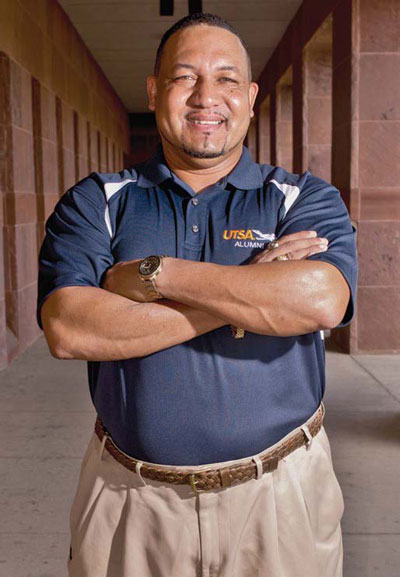Still Serving
William O. Dawson III ’10, M.P.A. ’13
Fresh from a career in the military and a short stint as a civil servant for the Department of the Army, William O. Dawson III arrived on the UTSA campus for the fall 2008 semester ready to secure a degree.
Five years and two degrees later, including an M.P.A., the veteran of the Army Intelligence Corps is still involved in spearheading efforts to assist other veterans transitioning to life in academia.
He earned his B.A. in political science in 2010 to fulfill a promise to his single mother who sometimes worked three jobs to support Dawson and his younger sister.
“I had to sell her on the military educational benefits, because it was the only way to convince her to sign me into the Army when I was 17,” he said.
As an undergrad, he relied heavily on tutors and advisers “who helped me make the transition [out of the military environment to] academics,” he said.
But he noticed other ex-military students struggling with their transition. So in spring 2009, he helped found the Student Veterans Association, and served as its president for three years and its secretary during the initial year. The association serves 2,700 veterans and their family members who have enrolled for courses at UTSA under the GI Bill and the Hazlewood Act.
The group is also part of UTSA’s Veterans Service Advisory Committee, which brings together all entities involved in facilitating on-campus services for student veterans and their families. He said the purpose is to make veterans’ on-campus experiences as seamless and efficient as possible.
Often, younger veterans who have been in combat struggle with physical as well as psychological issues. Having somewhere to turn for help is critical, Dawson said.
“Coming out of the military, you are used to a supportive, regimented world, but then these younger veterans encounter the world of academia, where you are basically on your own, and then you realize that the sergeant or chief is not there motivating you, directing you or getting you up in the morning,” Dawson said.
The SVA and the advisory committee help veterans cope with everything from delays in GI Bill payments, which cover schooling costs, to providing support services both on and off-campus, assisting in career development and coordinating veteran recruitment drives to encourage all veterans to enhance their education and skills portfolio.
He said that his group increasingly works with veterans suffering from mild cases of post-traumatic stress disorder.
“The military provides veterans with numerous skills to fight wars, engage enemies abroad and support and defend the Constitution, but it somehow fails to teach many of us how to take the array of skills and abilities and transition them into real-world, civilian skills that veterans need to thrive and prosper with the other 99 percent of Americans,” Dawson said.
Dawson now works for the U.S. Department of Housing and Urban Development as a community planning and development representative. He continues to serve as an adviser to the Student Veterans’ Association executive council and is the organization’s external liaison.
“The type of support and services that organizations like the SVA provide are invaluable to fill in the gaps while our fighting men and women transition to the real world, academic life and then on to their chosen career,” Dawson said.
–Guillermo Garcia

